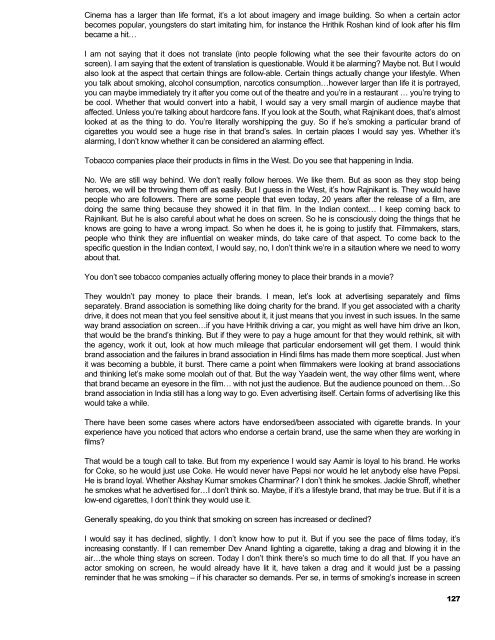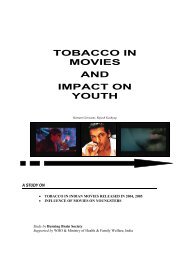Professional Report - Smoke Free Movies
Professional Report - Smoke Free Movies
Professional Report - Smoke Free Movies
Create successful ePaper yourself
Turn your PDF publications into a flip-book with our unique Google optimized e-Paper software.
Cinema has a larger than life format, it’s a lot about imagery and image building. So when a certain actor<br />
becomes popular, youngsters do start imitating him, for instance the Hrithik Roshan kind of look after his film<br />
became a hit…<br />
I am not saying that it does not translate (into people following what the see their favourite actors do on<br />
screen). I am saying that the extent of translation is questionable. Would it be alarming? Maybe not. But I would<br />
also look at the aspect that certain things are follow-able. Certain things actually change your lifestyle. When<br />
you talk about smoking, alcohol consumption, narcotics consumption…however larger than life it is portrayed,<br />
you can maybe immediately try it after you come out of the theatre and you’re in a restaurant … you’re trying to<br />
be cool. Whether that would convert into a habit, I would say a very small margin of audience maybe that<br />
affected. Unless you’re talking about hardcore fans. If you look at the South, what Rajnikant does, that’s almost<br />
looked at as the thing to do. You’re literally worshipping the guy. So if he’s smoking a particular brand of<br />
cigarettes you would see a huge rise in that brand’s sales. In certain places I would say yes. Whether it’s<br />
alarming, I don’t know whether it can be considered an alarming effect.<br />
Tobacco companies place their products in films in the West. Do you see that happening in India.<br />
No. We are still way behind. We don’t really follow heroes. We like them. But as soon as they stop being<br />
heroes, we will be throwing them off as easily. But I guess in the West, it’s how Rajnikant is. They would have<br />
people who are followers. There are some people that even today, 20 years after the release of a film, are<br />
doing the same thing because they showed it in that film. In the Indian context… I keep coming back to<br />
Rajnikant. But he is also careful about what he does on screen. So he is consciously doing the things that he<br />
knows are going to have a wrong impact. So when he does it, he is going to justify that. Filmmakers, stars,<br />
people who think they are influential on weaker minds, do take care of that aspect. To come back to the<br />
specific question in the Indian context, I would say, no, I don’t think we’re in a sitaution where we need to worry<br />
about that.<br />
You don’t see tobacco companies actually offering money to place their brands in a movie?<br />
They wouldn’t pay money to place their brands. I mean, let’s look at advertising separately and films<br />
separately. Brand association is something like doing charity for the brand. If you get associated with a charity<br />
drive, it does not mean that you feel sensitive about it, it just means that you invest in such issues. In the same<br />
way brand association on screen…if you have Hrithik driving a car, you might as well have him drive an Ikon,<br />
that would be the brand’s thinking. But if they were to pay a huge amount for that they would rethink, sit with<br />
the agency, work it out, look at how much mileage that particular endorsement will get them. I would think<br />
brand association and the failures in brand association in Hindi films has made them more sceptical. Just when<br />
it was becoming a bubble, it burst. There came a point when filmmakers were looking at brand associations<br />
and thinking let’s make some moolah out of that. But the way Yaadein went, the way other films went, where<br />
that brand became an eyesore in the film… with not just the audience. But the audience pounced on them…So<br />
brand association in India still has a long way to go. Even advertising itself. Certain forms of advertising like this<br />
would take a while.<br />
There have been some cases where actors have endorsed/been associated with cigarette brands. In your<br />
experience have you noticed that actors who endorse a certain brand, use the same when they are working in<br />
films?<br />
That would be a tough call to take. But from my experience I would say Aamir is loyal to his brand. He works<br />
for Coke, so he would just use Coke. He would never have Pepsi nor would he let anybody else have Pepsi.<br />
He is brand loyal. Whether Akshay Kumar smokes Charminar? I don’t think he smokes. Jackie Shroff, whether<br />
he smokes what he advertised for…I don’t think so. Maybe, if it’s a lifestyle brand, that may be true. But if it is a<br />
low-end cigarettes, I don’t think they would use it.<br />
Generally speaking, do you think that smoking on screen has increased or declined?<br />
I would say it has declined, slightly. I don’t know how to put it. But if you see the pace of films today, it’s<br />
increasing constantly. If I can remember Dev Anand lighting a cigarette, taking a drag and blowing it in the<br />
air…the whole thing stays on screen. Today I don’t think there’s so much time to do all that. If you have an<br />
actor smoking on screen, he would already have lit it, have taken a drag and it would just be a passing<br />
reminder that he was smoking – if his character so demands. Per se, in terms of smoking’s increase in screen<br />
127



